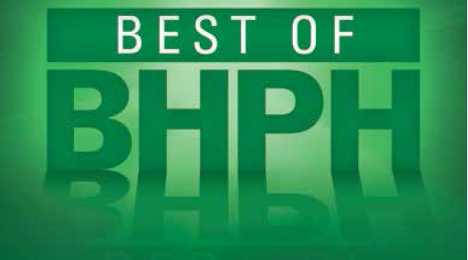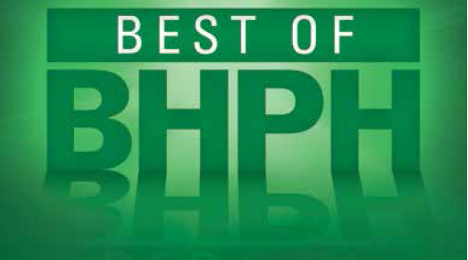In the latest installment of the annual Best of BHPH issue of BHPH Report, we go behind the scenes with some of the leading companies in the used-car space and their top executives with a few Q&A features.
Next up in this series is Brent Carmichael, executive conference moderator of 20 Groups at NCM Associates.
BHPH Report: What’s your assessment of what it’s been like for the typical BHPH dealer in 2016?
Brent Carmichael: It’s been a lot tougher. Subprime is still the main competitor for us. They’re still really aggressive even though we’re starting to hear that it’s starting to taper off in some areas. But most of them are still pretty aggressive.
The regulatory side of the business obviously has a lot of dealers concerned. The general feel is that lot traffic is down, so there’s not as many people in the market overall. There are just fewer customers to sell to at this point.
From a collections standpoint, there is a little heightened level of frustration with getting customers to pay and pay on time. There seems to be more of a lackadaisical attitude with the customer base as far as making their payments. I think a lot of that’s driven by they have more options now than they ever have before. If they don’t like the car or are having issues with the car or don’t like the way they’re being treated from a collections standpoint, they’ll just give up and go somewhere else to buy a car. It’s been tougher this year than it has the past couple of years, that’s for sure.
BHPH Report: How much more receptive to new ideas have dealers been in your 20 Group meetings this year?
Brent Carmichael: They’re much more receptive. They’re still looking for that silver bullet. Some of them who were kind of closed-minded in the past about changing their business model are starting to look at different business models.
As an example, some used to say that they would never take on a subprime retail environment and now they’re looking at doing that. Some are looking at a higher (actual cash value) car. They are probably more open-minded to change now than they’ve ever been because they realize the subprime thing is not going to go away. The competitive market is going to be there. In the past, we’ve been able to sit back and ride it out for 18 months or maybe two years at the most. But we’re going on year three, and it doesn’t look like it’s going anywhere. Now they’re looking at anything they can do differently. They might even look at something completely different.
Some are even looking to get out of the business at this point, that now might be a good time to exit the business with the current environment and what the future might hold.
BHPH Report: How difficult has it been for operators to work with their customers to keep them current on their contracts?
Brent Carmichael: That’s something we’ve always had the ability to do. We can set our policies and procedures so we can let them be as delinquent as we want to and work with them as much as we can, obviously unless there’s some sort of bank covenant or line of credit covenant that might restrict some of that.
Again, we’ve had dealers in the past who were pretty strict on their collections guidelines who now have opened up and are willing to adjust accounts or accept deferred payments if it’s necessary to keep the customers. They’ve become more open-minded and understanding the value of a customer is probably higher now than it’s ever been. They’re trying to help everyone who is at least trying to make their payments. Some of the customer base hasn’t taken as much pride in ownership as they have in the past, so dealers are more open to working with the ones who are really trying.
Back when I used to be a dealer, we expected the payment to be made on or before the due date. Now we understand that life issues happen and work with customers more than we have in the past.
BHPH Report: What industry trends are you watching as we go into 2017?
Brent Carmichael: With the new ruling against the CFPB and how it’s structured, how that’s going to shake out, I don’t know when we’ll see any benefits of that in the near future. But that’s something that obviously could impact the landscape moving forward.
I think the main focus for most dealers believe it or not is just back to basics more than anything else. They might not be looking to buy the next latest, greatest thing, rather looking internally and making sure they’re doing everything from a blocking-and-tackling standpoint.
Inventory used to be a big issue but it’s not so much anymore. I’m hearing from dealers currently in the group that auction prices are down, so that’s starting to look up for us. There is starting to be some inventory freed up, so that should be a positive going into 2017.
Still the regulatory environment, exactly what rules are we supposed to follow and how we’re supposed to play by them, that’s probably the biggest concern moving forward.
Additional pieces from this series can be found below:
4 questions with Ace Christian of the Arizona Independent Automotive Dealers Association
4 questions with Bill Caan, national sales manager at CalAmp
In the latest installment of the annual Best of BHPH issue of BHPH Report, we go behind the scenes with some of the leading companies in the used-car space and their top executives with a few Q&A features.
Next up in this series is Ace Christian, chair of Arizona Independent Automotive Dealers Association and owner of Rock Solid Auto Center
BHPH Report: How would you describe the competition your dealership has faced from subprime finance companies working with other stores?
Ace Christian: In 2016 and over the last 30 months, we have seen a lot of competition from subprime finance companies working with other independent and franchise dealers. Consumers with FICO scores between 500-600 used to be our target customers, but today we are lucky if we see 400-500 scores coming to our store.
We have also noticed that customers who have already purchased from us are returning cars earlier than in the past. Our static pool bell curve for repos was at its best between 18-26 months. Today that has changed to where customers are returning vehicles between 8-16 months because they have more options, and subprime finance companies don’t seem to care if the customers return vehicles to us in order to purchase a new car.
So, all that being said, we are seeing a slight slowdown in revenue. The first quarter of this year was not as we hoped it would be. It was better than the year before, but still not as good as 2011-2012. However, in the last six months, we have seen some customers coming back, and some of them have current repos from these subprime companies. I’m not saying that we are seeing a shift, because it’s still too early to tell. If this period of competition is nearing its end, subprime lenders may push hard one more tax season before they exit. If we see a 20-30 percent increase in sales (back to our normal 55-60 sales per month) this next tax season, I will be more inclined to say the tide is turning.
BHPH Report: How difficult has it been to maintain underwriting standards knowing what the competition might be doing?
Ace Christian: This is a good question because it has been a roller coaster ride when it comes to underwriting. We first realized that we were having issues when sales started to fall back in 2013. As we reviewed our whole portfolio and noticed customers were returning vehicles faster, we initially thought we should just sell more cars to replace them. However, this was easier said than done because of our underwriting guidelines. We just weren’t seeing the same types of customers coming in and shopping like we had in previous years.
After a few months and attending some conferences, we realized that competition from subprime companies had arrived, and they were taking our customers on the front end and the back end. Well, our first response was to reach down into the subprime market and buy deeper. We realized after a short period this was not working and we needed another plan. So we decided to reduce our sales goals, lower our overhead costs and reduce staff so we could maintain our underwriting guidelines. We had a decision to make — keep selling at the rate of 55-60 a month or reduce down to 45-50 a month. We decided to be conservative and take the latter.
Even doing that caused us in some months to take more risks on deals we normally wouldn’t do. Otherwise we would have only sold 30 cars in those months. Our decision to reduce cost and sell less was based on how the loans were performing from 18 months ago when we realized that subprime was not backing down and was becoming more aggressive. So we have looked harder at all deals coming in and have reduced our ACVs significantly compared to where we were 30 months ago, so that our risk was reduced.
BHPH Report: What’s it been like to acquire inventory that will turn?
Ace Christian: I’ve been known to say, “When the auction prices get out of line, recycle, recycle, recycle.” Most of the cars we are selling have been from our efforts to recycle the cars charging off to get the most out of the vehicles we have already invested in. As I said earlier, with cars being returned within an 8-16 month period, we have no choice but to reinvest into these cars and resell what we have. We have seen repos coming back needing more reconditioning, but not any more than the cars purchased at auction. There has been some increase in the selection of cars, and auctions seem to be heavy with inventory. Even so, prices have not fallen as much as they should have based on inventory levels, so we are being selective when we do purchase and reinvesting in what we already own. There has been a lot of competition at the auction for the cars we sell, and it doesn’t seem to be slowing down.
BHPH Report: What aspect of your dealership business do you want to improve most in 2017?
Ace Christian: Of course, sales are the No. 1 improvement we would like to make in 2017. If we are unable to do that because of competition, we will continue to reduce costs and improve our processes. We have also invested a lot of time in the last two years becoming compliant in all areas of our business, and we will continue to focus on that. Even though we are small, no one in the BHPH industry should take the government lightly.
Our new objective is on reducing our costs even further and becoming more productive in our processes. The cost of doing business seems to be a big concern for everyone I talk to. Of course, if you’re not selling what you would normally sell, you must trim the fat as much as you can in 2017.
One of the biggest improvements we made at our dealership was implementing SecureClose, an automated closing solution that uses a computerized avatar to walk car buyers through the paperwork and virtually record and store the entire transaction in the cloud. SecureClose helped with our compliance goals, but it also significantly reduced our costs and streamlined our processes. In 2017, we expect to become fully paperless with most of our processes thanks to products like SecureClose. Paperless processes seem to be where this industry is moving, and I have seen significant cost savings in the systems we are using now.
Long story short, until the competition exits our industry and we start to see our customers come back, we must look at our business from a 30,000-foot level and ask ourselves whether we are being as efficient as we can and learn about the technology available today to help lower our costs and improve our processes. No one can really say how much longer we will be in this situation, but when the tide turns and you’ve already tightened up your costs and streamlined your business, you will be in a much better position than dealerships who ignored all the warning signs.
As the year closes, it is time to look forward and plan for next year. Recent performance data for the subprime auto finance market indicates that better days are ahead for independent buy-here, pay-here operators who can capitalize on the opportunities.
Recent data from Experian Automotive indicates that through the third quarter of 2016, “installment finance contracts with deep-subprime consumers dropped 2.8 percent to the lowest level on record since 2011. Looking specifically at used-vehicle financing, analysts noted that the subprime auto finance sectors saw an even larger decrease. Financing for consumers with deep-subprime credit dropped by 5.3 percent to 5.11 percent; the lowest Experian has seen on record since 2007.”
This market change with deep-subprime customers (who prior to 2014 purchased BHPH vehicles from independent operators) subsequently bought and financed them from franchised dealers, independent finance companies and credit unions. The recent market change now allows independent operators to regain that lost market share.
The third quarter Experian report shows that lenders reduced loans to subprime and deep-subprime risk tiers while increasing loans to consumers with better credit. Although the credit unions continue to aggressively grow market share, the other competitors have tightened underwriting standards and are focusing on consumers with better credit scores.
Independent operators can benefit from the aforementioned market change by regaining market share lost during the last three years if they are positioned to do so. Here are the important things they will need to prosper in 2017 and beyond:
1. Capital availability to fund future growth.
2. A proper business model to “keep the new deals sold” over the life of the installment contracts.
3. They must rebuild their “bond” with previously lost customers and use the web and social media to find new ones.
4. Participate in dealer education to avoid underwriting and collection mistakes that reduce profitability and create costly compliance problems.
5. Carry inventory that provides affordable transportation to credit impaired customers on reasonable terms.
Here are the best ways to get the items needed to succeed:
1. Capital to fund portfolio growth should come from collections, equity or from borrowings under lines of credit or by selling previously originated contracts. Dependence on borrowed capital or by liquidating existing portfolios reduces an operator’s financial flexibility and should not be relied upon. “Keeping contracts sold” and collecting payments is more important than just increasing originations.
2. The best way to evaluate your existing business model is to study past bad debt losses. This analysis requires you to look “under the hood” of your portfolio at year-end when all charge-offs have been recorded. To understand what performance metrics are needed and ways to utilize this information to make better underwriting decisions visit www.subanalytics.com and watch two free videos on the home page of this website.
3. The best way to rebuild customer relationships is to contact past customers via mobile, web and social media technology. You may find that those customers are unable to afford the vehicles sold to them by your competition and are seeking more affordable transportation.
4. Dealer education is needed to become familiar with market and regulatory changes and to avoid making compliance mistakes. At the NABD National BHPH Conference on May 23-25 at Encore in Las Vegas the program will focus on “the changing world of BHPH” and the best ways to meet new challenges. Legal and regulatory updates will also be included in the conference agenda. The more you learn, the more you will earn.
5. Efficient systems are needed to grow portfolio profitability. During the last three years, many independent operators reduced overhead due to reduced sales. Instead of restoring these previous overhead levels, implementing new and improved technology for underwriting, collections and inventory sourcing is a better alternative. Operators can see and evaluate the new technology at upcoming educational conferences.
6. Sourcing, acquiring and reconditioning good inventory has always been challenging. However, the aforementioned market changes has reduced competition, increased supply, and caused wholesale prices to decline. New technology is available to broaden inventory sourcing options and increased repossessions enhance availability.
Independent operators cannot regain lost market share immediately. BHPH portfolios are best built over time and not overnight! In the New Year, operators are encouraged to benefit from competitor’s underwriting mistakes, not repeat them. Good luck.
Ken Shilson is president of Subprime Analytics (www.subanalytics.com) and the National Alliance of Buy-Here, Pay-Here Dealers (www.bhphinfo.com). Subprime Analytics uses data mining to perform computerized portfolio analysis for operators and capital providers. NABD is the nation’s largest BHPH special interest group for operators and product providers with more than 13,000 members. NABD will host a National BHPH conference on May 23-25 at Encore in Las Vegas. For more information call (832) 767-4759 or visit www.bhphinfo.com. He also can be reached at [email protected].
BHPH Report and NCM Associates are set to join a free webinar hosted by Dealer Profit Pros that’s meant to give buy-here, pay-here dealers constructive information to form strategy for 2017 and beyond.
The session is scheduled for 1 p.m. ET (10 a.m. PT) on Thursday.
“For the last several years we’ve made predictions and revealed new opportunities for dealers to meet or exceed their goals for the upcoming year. Each year dealers have offered great feedback on the information provided,” said webinar host Kenny Atcheson, who is founder of Dealer Profit Pros; a Las Vegas-based company that facilitates dealer marketing programs and more.
“This year will bring bigger changes than ever in part because of a new administration, starting with the president,” Atcheson continued.
Topics will range from how to improve underwriting and collections as well as other parts of your operation along with an update on what’s happening at the Consumer Financial Protection Bureau.
Space is limited for this webinar. Dealers can complete registration for this event by going to this website.
Buy-here, pay-here dealership chain J.D. Byrider recognized winners of the company’s annual awards at its November convention in Scottsdale, Ariz.
The Franchise of the Year winners were chosen in three categories: Single (one location), Mid (two to three locations) and Multiple (more than three locations). The winners were:
• Single: Keith Kocourek for his location in Wausau, Wisc.
• Mid: Barry Biggers and team for their locations in Pearl, Miss., and Jackson, Miss.
• Multiple: Russ Larson and team for his eight locations in Huntsville, Ala.; Burlington, Cedar Rapids, Davenport and Des Moines, Iowa; Columbia and Springfield, Mo.; and Omaha, Neb. This is their 11th consecutive Franchise of the Year award.
J.D. Byrider also distributed 17 President’s Awards, which are given to individual locations based on store earnings, portfolio quality and customer service ratings. This year’s President’s Award winners are located in:
• Arkansas
Springdale at 2737 N. Thompson St., Dave Hanson, owner
• Florida
Jacksonville at 7739 Blanding Blvd., Jim Kagiliery and Jim Thompson, owners
• Illinois
Glendale Heights at 800 North Ave., Mike Burgstone, owner
Joliet at 2323 W. Jefferson St., Mike Burgstone, owner
• Indiana
Bloomington at 2425 W. 3rd St., Terry Gerhart, Mike Bolin, Ben Becht, owners
• Iowa
Burlington at 125 S. Roosevelt Road, Russ Larson, Doug Stewart, Jeff Lee, Daryl Nelson and Gerod Meier, owners
Davenport at 925 W. Kimberly Road, Sheila Schaub, Jeff Nickerson and Tedd Pless, owners
Des Moines at 2426 SE 14th St., Russ Larson, Jeff Lee, Doug Stewart, Daryl Nelson and Paul Newman, owners
• Kentucky
Owensboro at 250 E 18th St., Jeff Anderson, owner
• Mississippi
Jackson at 5719 I-55 N. Frontage Rd., Barry Biggers, owner
Pearl at 2521 Highway 80 E., Barry Biggers, owner
• Missouri
Springfield at 1226 S. Glenstone Ave., Russ Larson, owner
• Ohio
Mansfield at 1810 W. 4th St., Chris McPhie, owner
• South Carolina
Greenville at 2400 Laurens Rd., J.T. Gandolfo, owner
• West Virginia
Parkersburg at 1328 7th St., Billy Rowland, owner
• Wisconsin
Appleton at 2301 W. College Ave., Russ Darrow, Jr., owner
Wausau at 2518 Grand Ave., Keith Kocourek, owner
“We are extremely proud of each of this year’s winners,” said Tom Welter, vice president of franchising for J.D. Byrider. “They have risen to the top of our dealer community with their quality service to customers.
“These awards are a great reminder of the strength within our franchise system and our drive for improvement year after year,” Welter went on to say.
As another year closes, buy-here, pay-here operators must focus on how to make next year better. The answers can’t be found in their year-end financial statements or even by reviewing unit sales numbers.
This article will discuss what every operator should evaluate in order to improve performance and profitability as follows:
1. Indicators that your installment contracts portfolio needs a tune-up.
2. Proactive ways to improve portfolio performance by using metrics as your guide.
3. The proper accounting for bad debt losses and why charging off those losses should not be deferred.
4. Is your business model designed for success or failure?
5. What you can learn from your losses so you do not repeat them!
Here are some indicators that your installment portfolio needs a tune-up:
1. Your receivables are increasing but your collections are decreasing.
2. You are selling more vehicles but your portfolio is not growing at the same rate.
3. Your bad debt losses are increasing and you don’t know why!
4. Your portfolio is more than 50 percent liquidated and you aren’t replacing the “run off” with new originations.
5. Your portfolio performance is worse than the NABD industry benchmarks, which are available at www.subanalytics.com.
Hoping that next year will get better is not a prudent strategy. Waiting for the competition to decline or disappear isn’t the answer either. You must take a proactive approach to improving your internal portfolio performance and not depend on the competition declining.
The first step is to develop portfolio metrics: static pool, loss/liquidation, and default rates which are needed so you can compare your performance with your peers and identify performance trends. Here is what you can learn from the aforementioned metric calculations:
• Net Static Pool Rates – measures the frequency and severity of your bad debt losses after recoveries (in dollars) over the life of pools of installment receivables. (This is your performance report card!)
• Net Loss/Liquidation Rates – measures the pace of losses in your portfolio (after recoveries) in dollars before pools of receivables are fully amortized. This measurement is important for projecting cash flow, anticipating future losses, and in identifying changing trends.
• Default Rates – measures the frequency of bad debt losses in units (not dollars) over the life of your installment portfolio. This metric is used to measure volatility and portfolio quality.
If you don’t have these metrics your access to capital to fund portfolio growth will be severely limited. Capital providers use the aforementioned metrics to evaluate credit risk and to project loan repayment. You can’t expect to borrow millions of dollars without these portfolio barometers.
The next step is to charge-off your bad debts when losses become known. Bad debts in BHPH are not like wine; they don’t get better with age. When customers become delinquent 60 to 90 days their ability to “catch up” is unlikely. It is important that delinquent debt be charged off when it is identified so that losses can be mitigated and the appropriate collection action can be taken. If a charged-off account is subsequently collected the recovery should be recorded when received. A timely and consistent charge-off policy provides a realistic picture of your portfolio performance and helps you avoid financial surprises. These bad debt charge-offs are deductible for federal tax purposes so your corresponding tax liability is reduced.
Your business model dictates your BHPH success. You must evaluate your business model periodically for cash efficiency. That means determining the cash return (ROI) on your portfolio investment. You would not make other investments without first considering their ROI and the same holds true for building a BHPH portfolio. These calculations require the use of static pool and loss/liquidation metrics needed to project future cash flow, after bad debts and recoveries. Such projections are used to identify capital needs and predict future financial performance.
A new Credit Loss Measurement Standard passed by the AICPA in June will require you to reserve for future bad debt losses. You must determine how this new standard will affect your loan covenants and borrowing relationship as soon as possible. Metrics are needed to estimate future losses and to adjust your reserve for bad debts in your financial statements.
Those who do not make portfolio adjustments periodically cannot expect better results. The BHPH industry must regain market share by learning from their bad debt losses and not repeating them. Do not enter another year without “looking under the hood” of your own portfolio! The more you learn, the more you will earn! Good Luck!
Ken Shilson is president of Subprime Analytics, which uses data mining to perform computerized portfolio analysis for operators and capital providers to the subprime auto industry. For further information visit www.subanalytics.com or by calling (832) 767-4759.
There is still time for buy-here, pay-here operators — especially ones who can easily travel to Dallas — to register for the training sessions the National Independent Automobile Dealers Association is organizing for its first BHPH Summit.
The event is set for next Tuesday, Wednesday and Thursday at the Embassy Suites DFW Airport North.
“It’s yet another addition to an NIADA toolbox that continues to expand our level of service to the BHPH industry,” NIADA chief executive officer Steve Jordan said.
Here are some of the agenda highlights of the summit that’s being led by NIADA director of dealer 20 groups Chuck Bonanno as well as the association’s two other 20 group moderators and training consultants — David Brotherton and Mark Dubois:
— 2017 industry trends and opportunities
— Credit reporting
— Remote payment options
— Underwriting in a competitive environment
— Collections best practices
— Network monitoring and cyber security
— Lead management basics
— Future of GPS and starter interrupt technology
Some of the other experts scheduled to be part of the summit include Susan Perlmutter of Sigma Payment Solutions, Steve Levine of Ignite Consulting Partners, Lawrence Pappalardo of Equifax, Robert Wilson of DealerSocket and Bill Neyland of TaxMax.
The association is also assembling a collection of capital providers who will provide their insights into the capital situation facing many of today’s dealers.
NIADA senior vice president of legal and government affairs Shaun Petersen also is on tap to share a regulatory update to summit attendees, as well.
The summit begins with a special welcome reception hosted by Kevin Carr, who is the vice president of financial services at PassTime GPS.
“The entire dealership staff can take something valuable back from this event, and we’re encouraging dealers to bring their managers, salespeople, service staff and collectors by offering discounts for dealerships that bring multiple attendees,” Jordan said.
“While the scope of this event is large, the idea behind it is simple,” he continued. “We want to help every BHPH dealer become stronger, more efficient, more compliant and more profitable. We want to give them the latest information, the best tools and the brightest ideas to make that happen.”
More details about the event can be seen in the video at the top of this page or by going here.
Operators can complete registration for the NIADA’s BHPH Summit by going to this website.
From Kansas to Georgia to across the Atlantic Ocean over to England, attendees evidently received what they wanted when the National Alliance of Buy-Here, Pay-Here Dealers hosted its Best Practices Conference in Orlando, Fla., at the beginning of this month.
President Ken Shilson highlighted that approximately 60 percent of attendees surveyed afterward had never been to an NABD conference previously. What they told Shilson and the NABD team about the three-day event dubbed “Best Practices to Succeed Now” left organizers excited about how the gathering unfolded.
“Attendee evaluations unanimously indicated that the program will help them succeed in 2017 and beyond,” Shilson said. “Our speakers and sponsors did an outstanding job helping attendees achieve their learning objectives.”
One person who gained significant amount of knowledge was Ciara Kimsey of Momentum Motorcars in Marietta, Ga., who might be considered a “green pea” in the BHPH space.
“As a dealer about to convert to BHPH, the information has been beyond helpful,” Kimsey said.
Taryn Meier of Affordable Transportation Co. in Abilene, Kansas, added, “This conference was very informational and helped bring my focus back to what’s most important in BHPH. Loved it!”
Along with attendees from elsewhere in the U.S. as well as Canada, Gavin Leach made the trip to Florida from Berkshire, England.
“I travel 6,000 miles to come to the convention. Need I say more; I always learn something valuable to take back,” Leach said.
The conference opened with 14 different workshop sessions covering vendor compliance, recoveries, millennial marketing, new technology, deal jacket compliance, reconditioning, F&I best practices, tax refunds, payment devices, capital solutions, lease-here, pay-here and the latest accounting and tax developments. All these workshops were interactive so attendees could ask questions and get answers on all these important topics.
General education sessions began with a highly inspirational keynote presentation by Harris Rosen, owner of Rosen Hotels and Resorts in Orlando. His keynote presentation was followed by sessions covering current developments, sourcing and financing inventory using digital channels and a benchmarks and trends update.
The event concluded with sessions on customer communications, an operating best practices dealer panel as well as a collection best practices panel and presentation. The conference also included a first-timer reception with more than 150 attendees and a sold out exhibit hall with more than 70 exhibitors who offered all the latest products and services to make attendees more profitable.
“NABD Orlando did not disappoint as the trend of improved success continued in our exhibitor space,” TaxMax founder Bill Neylan said. “It’s nice to have the ability to get in front of BHPH dealers who are decision makers that are there to take action. We meet new attendees every year who come to NABD with the goal of improving their business.”
NABD also announced that it will hold its 19th annual National BHPH Conference at a new venue — Encore in Las Vegas on May 23-25. Encore is a premier Las Vegas hotel and casino facility, and NABD has arranged unprecedented discounted room rates with no resort fees. The conference will focus on the “changing world of BHPH and of NABD” with an entirely new and exciting program agenda.
“This is a must attend for both new and experienced operators who want to compete successfully in the subprime auto finance market,” Shilson said.
For information or to register, visit www.bhphinfo.com or call (832) 767-4759.
Answer Financial formed a partnership with Verifacto this week in an effort to help buy-here, pay-here dealers monitor whether their contract holders are keeping vehicle insurance policies current.
The companies highlighted Verifacto’s technology is designed to improve the way lienholders can track insurance compliance for its customers. The platform includes an interactive dashboard with built-in email and SMS functionality, enabling dealers and their related finance companies to send payment reminders and insurance notices to customers in the event that they have a lapse in payment or cancel an existing insurance policy without selecting a replacement.
Through the partnership, Verifacto can now introduce an insurance comparison shopping and buying solution with its notifications, to help customers find a new policy quickly and for a competitive price. The insurance platform is branded VeriSurance, a subsidiary of Verifacto, and is powered by Answer Financial’s comparison platform.
“Answer Financial enables us to improve upon our mission of providing secure solutions for our clients to manage and mitigate their lienholder responsibilities, while maximizing their financial and operational efficiencies,” Verifacto chief executive officer Hezi Moore said.
“By partnering together to provide our clients with this particular work flow solution, we’ll improve upon our overall value propositions in what we can offer automotive dealers and auto finance companies,” Moore continued.
In addition to tracking customers’ insurance compliance for dealers and finance companies, Verifacto can enable BHPH dealers to help vehicle buyers obtain immediate quoting and binding of coverage at the point of sale.
Customers can call at any time in the buying process to speak with one of Answer Financial’s expert and U.S.-based insurance agents. The easy-to-use platform allows customers to speed through the insurance purchase and get them into the F&I process.
On his experience as a Verifacto client, Ronnie Ranes, director of sales and marketing for M&S Auto Sales, said: “VeriSurance is a great addition to the Verifacto platform because it enables our customer to purchase insurance when they purchase a car, expediting the sales process. By matching them with the best car insurance companies based on their needs, our customers are sometimes able to qualify for a larger vehicle purchase by reducing their monthly insurance payment.”
Tom Capp, senior vice president of business development for Answer Financial, added, “Verifacto has first-hand and immediate knowledge when a customer defaults on their insurance, and we’re the perfect partner to help these customers find a new policy and get back into compliance on their car loans. We’re excited to team up with lienholders and to protect drivers.”
Dealer Assist Now recently joined with the National Independent Automobile Dealers Association as its latest National Member Benefit partner, offering handwritten custom vehicle comments to the association’s independent and NIADA Certified Pre-Owned dealers.
NIADA members who sign up for Dealer Assist Now can receive discounts on personal writers and self-service library access.
Dealer Assist Now provides custom vehicle comments/descriptions for dealership inventory that are designed to go far beyond the information provided by a VIN decoder or auto-generated comment.
Dealer Assist Now insisted the company can tell the story of the vehicle to help potential owners get a real feel for what each vehicle would be like to own and drive. They include keywords to support keyword searches and SEO, highlight unique features and are checked for accuracy.
An experienced team of automotive writers is charged with making sure the description balances the technical details with the story to maximize viewers' time on page to increase the possibility of a conversion to buyer.
Dealers get an experienced team of automotive writers working to helping them make sales — at a fraction of the cost of hiring an in-house writer — with self-service or full-service options.
“Our only goal is to help dealers sound their best online, every day, with every vehicle,” Dealer Assist Now founder Aaron Johnson said. “We’re excited to offer NIADA members a way to speak to the buyer in a way that helps them choose your vehicle out of the mix because it sounds the best.”
NIADA senior vice president of member services Scott Lilja added, “The addition of Dealer Assist Now to our group of endorsed National Member Benefit partners falls right in line with our support of services to help dealers with their online sales activities.
“Given that most vehicle searches start online, having quality vehicle comments is critical. So we are thrilled to partner with a company that makes them easy,” Lilja went on to say.
For more information or a consultation, call (402) 679-7223 or visit www.dealerassistnow.com.












